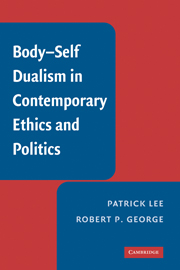3 - Hedonism and Hedonistic Drug-Taking
Published online by Cambridge University Press: 27 July 2009
Summary
Our claim in this book is that although human beings are bodily entities, rational animals, many of the contemporary, heated ethical controversies arise because some people implicitly (and wrongly) view the self as a pure consciousness (not necessarily substantial), and the body as a mere extrinsic tool. In this chapter we argue that this pattern is exemplified in the ethical theory of hedonism and, in particular, in the practice of hedonistic drug-taking.
What Hedonism Is
Traditionally, hedonism is divided into two types: psychological hedonism and ethical hedonism. The psychological hedonist says that as a matter of psychological fact, people are always motivated by the desire for pleasure, either short-term or long-term. The ethical hedonist says two things: first, that the only state of affairs that is good for its own sake is pleasure – nothing is good unless it is itself a pleasure or a means of producing pleasure; second, that one should act for the sake of producing maximum pleasure (either for oneself or for people in general).
The two types of hedonism are distinct but obviously related. If pleasure alone is desired and desirable for its own sake (psychological hedonism), then it seems to be the only good (the first tenet of ethical hedonism) – since to say that an object, activity, or state is good is to say at least that it is desirable.
- Type
- Chapter
- Information
- Body-Self Dualism in Contemporary Ethics and Politics , pp. 95 - 117Publisher: Cambridge University PressPrint publication year: 2007



